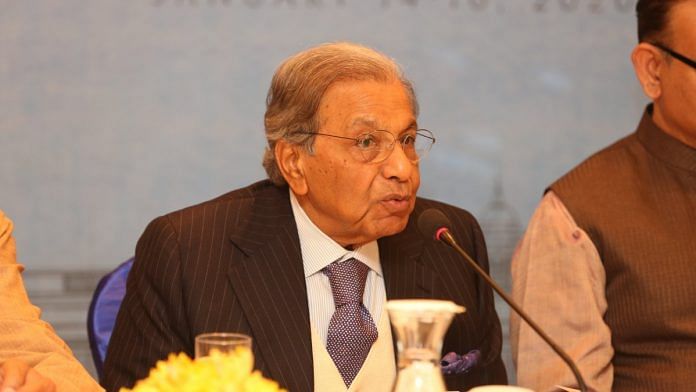New Delhi: Finances of the central and state governments are under a massive strain due to the Covid-19 pandemic, the chairman of the 15th Finance Commission said Friday, noting that most of the panel’s earlier estimates about growth and revenue buoyancy for 2020-21 may not hold for now.
The commission will wait for GDP data — the Q4 2019-20 data to be released in the last week of May and Q1 2020-21 data to be released in the last week of August — to get greater clarity on the various macroeconomic variables, N.K. Singh said. The central government, he added, expects a V-shaped recovery, which signifies a plunge in growth followed by quick recovery.
Singh made the remarks during a media briefing via video conference, held on the concluding day of a two-day meet with the economic advisory council, comprising economist Sajjid Chinoy and Chief Economic Adviser Krishnamurthy Subramanian, among others.
State governments, he said, have informed the finance commission about the massive strain in their finances on account of rising expenditure and contracting revenues.
According to Singh, the monetisation of deficit, wherein the government directly borrows from the Reserve Bank of India (RBI), may not be the best option in the current circumstances.
Asked if the commission would revisit the recommendations it made to the government for 2020-21, Singh said the commission has no business to do so “suo motu”. There is a need, he added, to check if such a provision is available under the Constitution.
Also read: Coronavirus lockdown subdued ‘animal spirits’ of Indian economy in March
‘Not just size, look at the design of stimulus’
According to a press statement issued by the commission, the economic advisory council had advocated measures to support non-banking finance companies (NBFCs) and micro, small and medium enterprises, and favoured a more nuanced stimulus.
“Governments will have a substantial expenditure burden on account of health, support to poor and other economic agents. The council members felt that the shortfall in tax and other revenues will be large due to subdued economic activity,” the statement said.
“Hence, fiscal response to the crisis should be much more nuanced. It is important not just to look at the size of fiscal response but also carefully at its design.”
Small-scale enterprises were cash-starved even prior to the onset of the pandemic. As their activity levels and cash flows are affected, it is important that a support mechanism be devised to help them overcome the problem, the statement quoted the council as having said.
It also recommended partial loan guarantees for non-banking finance corporations (NBFCs) to avoid bankruptcies and deepening of bad debts in the financial sector.
The fiscal deficit worries
The Covid-19 pandemic has wreaked havoc on finances of the central as well as the state government. Singh said there are “huge uncertainties” to the tax and non-tax revenues at both levels.
“States are also likely to get a lower amount of tax devolution due to a contraction in the overall share of central taxes,” he added.
During a presentation made to the commission Thursday, Singh stated, Subramanian had said the government was expecting a V-shaped recovery.
“We will monitor the situation very carefully. We need not firm up our recommendations right now,” Singh said, referring to the finance commission’s report, due this October, for five years beginning 2021-22.
On possible amendments to the Fiscal Responsibility and Budget Management (FRBM) Act to allow the central government to deviate by more than the 0.5 percentage points from its fiscal deficit road map, Singh said the idea is to remain within the broad framework of the FRBM Act.
Union Finance Minister Nirmala Sitharaman already used the escape clause in her February budget — much before the Covid-19 pandemic — after lower growth impacted government finances.
On demands from states that the fiscal deficit target be revised from the existing 3 per cent of the gross state domestic product, Singh said states’ own FRBM Acts allow them a 0.5 percentage-point leeway similar to the one available to the central government.
Any further increase may need amendments to the existing acts and probably permission from the central government, he added.
Also read: Study shows coronavirus lockdown can be beneficial for economy




Ashok and suresh both are super inteligent people in the earth..
Covid-19 has hit govt funds because govt did not know how to handle economy before Covid-19. Now the job of managing economy even harder. All we can say is good luck.
Monetising the deficit, printing currency, essentially coloured pieces of paper which we used as children while playing Monopoly, is a terrible idea. Or running out of ideas altogether. It will lead to economic ruin, not a V shaped recovery. 2. The Governor of the RBI, the CMDs of institutions like LIC and ONGC, should ask themselves why they allowed their reserves to be vacuum cleaned in normal times. They did not defend the long term interests of the institutions. They also left nothing for a rainy day.